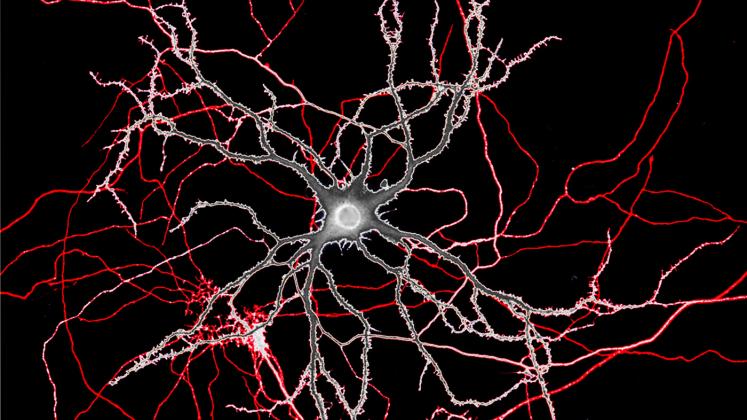


The Department of Physiology, headed by Univ.-Prof. Dr. Gerald Obermair, was founded in 2019. The research focus is on the study of the role of nerve cells in health and disease.
Specifically, we investigate how nerve cells in the brain form connections (synapses) with each other and why these are crucial for learning and memory formation. In our research, we mainly investigate the role of so-called calcium channels, cellular proteins that regulate the important second messenger calcium. Our findings also provide us with insights into mechanisms that may underlie neurological diseases such as autism, schizophrenia and Parkinson's disease. The Department of Physiology thus strengthens the research focus "Mental Health and Neuroscience" at Karl Landsteiner Private University.
In our research in the Department of Physiology, we mainly investigate the role of calcium channels in nerve cells of the brain. Calcium channels regulate the entry of calcium into nerve cells in response to electrical activation; for this reason the channels are also called voltage-activated calcium channels.
Calcium channels regulate a variety of important functions, such as synaptic transmission, learning and memory, muscle contraction and hormone release (see figure). Dysfunctions of these ion channels result in various neuronal and endocrine diseases such as autism, anxiety, schizophrenia, Parkinson's disease, diabetes, eye diseases and various forms of muscle weakness. In our research in the Department of Physiology, we mainly investigate the role of calcium channels in neurons of the brain. Calcium channels regulate the entry of calcium into nerve cells in response to electrical activation; for this reason, the channels are also called voltage-activated calcium channels. The channels consist of an α1 unit, this forms the pore through which calcium can flow into the cell (see figure), and regulatory β and α2δ units.
On the one hand, α2δ proteins regulate the functions of the calcium channels, on the other hand they are involved in the formation of the synapses. Moreover, α2δ proteins are the target proteins of the widely used drugs gabapentin (Neurontin) and pregabalin (Lyrica), which are prescribed for the treatment of epilepsy and, most importantly, chronic pain. In our lab, we have developed methods to explore the functions of α2δ in synapse formation in single neurons. This helps us to understand the role of these proteins in normal brain functions and those altered by diseases (e.g. autism, schizophrenia).
Wir verwenden Cookies, die zum einen technisch notwendig für die Funktionalität unserer Website sind, aber auch Cookies zu funktionellen, Marketing- und Analysezwecken um das Nutzungserlebnis auf unserer Seite zu optimieren. Mit Ihrer Einwilligung zu den Cookies werden sowohl von uns Daten verarbeitet als auch von Drittanbieter:innen, die ihren Sitz teilweise in Drittländern (z.B. den USA) haben. Nähere Informationen zu den Tools und den Partner:innen finden Sie in unserer Datenschutzerklärung, in der wir auch genau erklären, was eine Datenübermittlung in die USA bedeuten kann. Ihre Cookie-Einstellungen können Sie auf Wunsch jederzeit individuell anpassen oder widerrufen.
Zweck der Datenverarbeitung
Wir benötigen die Daten, um das Surfverhalten der Nutzer zu analysieren und Informationen über Nutzung der einzelnen Komponenten der Website zu erhalten. Das ermöglicht uns, die Website und ihre Nutzerfreundlichkeit stetig zu optimieren. In diesen Zwecken liegt unser berechtigtes Interesse nach Art. 6 Abs. 1 lit. f DSGVO begründet. Durch die Anonymisierung der IP-Adresse tragen wir dem Interesse der Nutzer am Schutz personenbezogener Daten Rechnung. Die Daten werden nie dazu genutzt, den Nutzer der Website persönlich zu identifizieren und werden nicht mit anderen Daten zusammengeführt.
Folgende Cookies werden nur nach Ihrer Zustimmung gesetzt:
Folgende Cookies werden nur nach Ihrer Zustimmung gesetzt:

